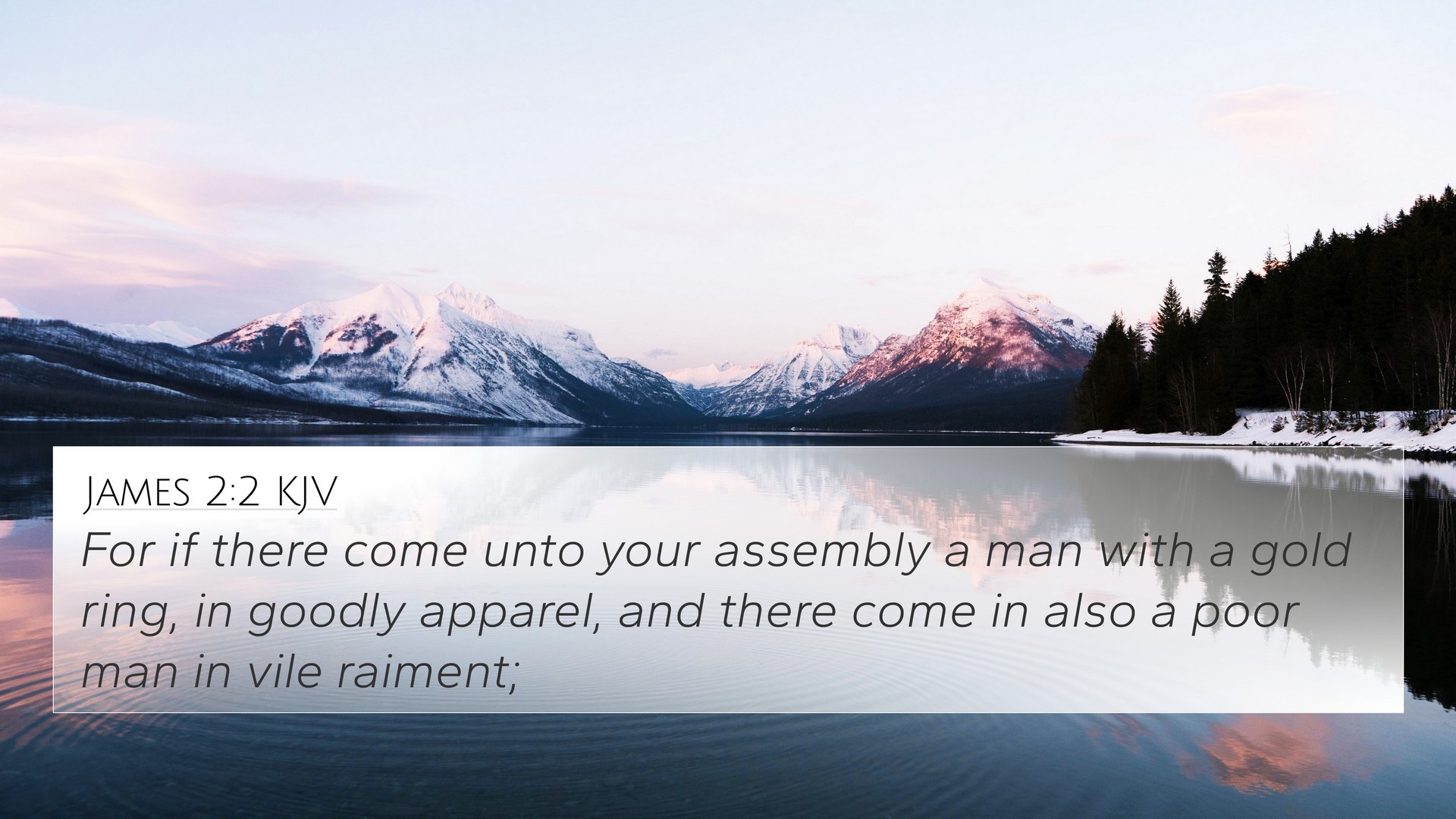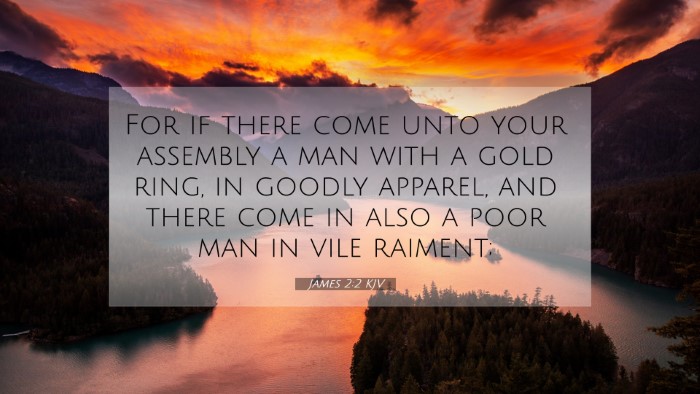Old Testament
Genesis Exodus Leviticus Numbers Deuteronomy Joshua Judges Ruth 1 Samuel 2 Samuel 1 Kings 2 Kings 1 Chronicles 2 Chronicles Ezra Nehemiah Esther Job Psalms Proverbs Ecclesiastes Song of Solomon Isaiah Jeremiah Lamentations Ezekiel Daniel Hosea Joel Amos Obadiah Jonah Micah Nahum Habakkuk Zephaniah Haggai Zechariah MalachiJames 2:2 Similar Verses
James 2:2 Cross References
For if there come unto your assembly a man with a gold ring, in goodly apparel, and there come in also a poor man in vile raiment;
Uncover the Rich Themes and Topics of This Bible Verse
Listed below are the Bible themes associated with James 2:2. We invite you to explore each theme to gain deeper insights into the Scriptures.
James 2:2 Cross Reference Verses
This section features a detailed cross-reference designed to enrich your understanding of the Scriptures. Below, you will find carefully selected verses that echo the themes and teachings related to James 2:2 KJV. Click on any image to explore detailed analyses of related Bible verses and uncover deeper theological insights.
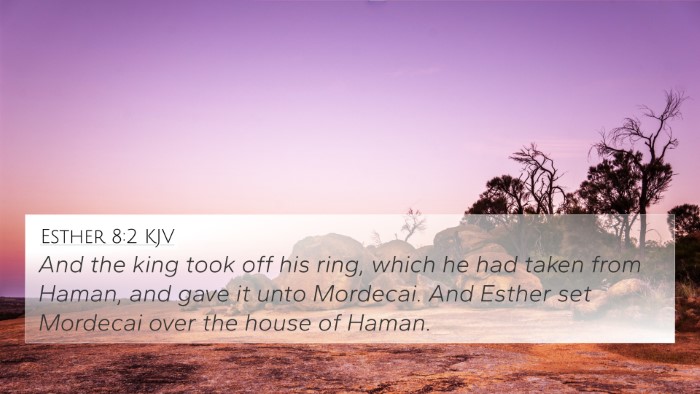
Esther 8:2 (KJV) »
And the king took off his ring, which he had taken from Haman, and gave it unto Mordecai. And Esther set Mordecai over the house of Haman.
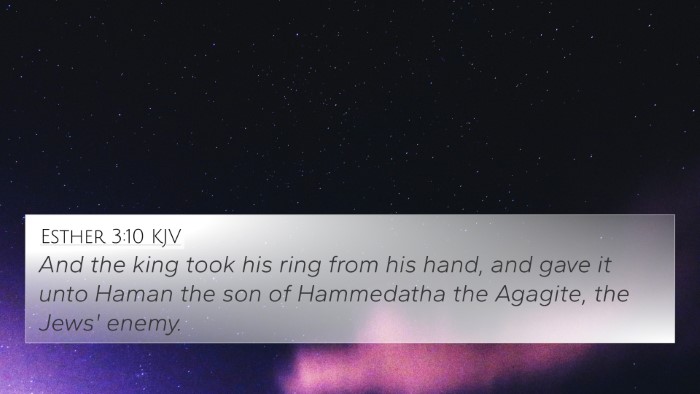
Esther 3:10 (KJV) »
And the king took his ring from his hand, and gave it unto Haman the son of Hammedatha the Agagite, the Jews' enemy.
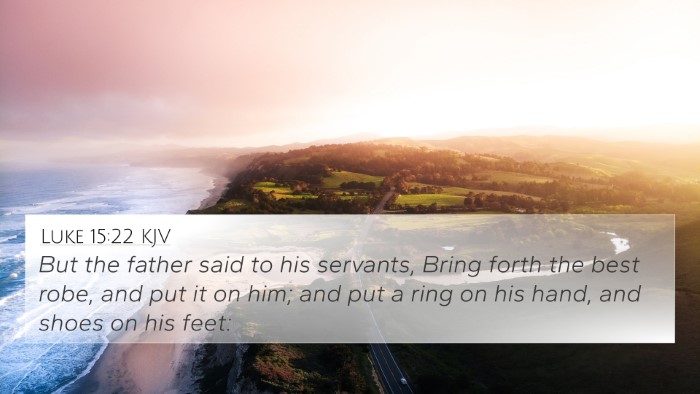
Luke 15:22 (KJV) »
But the father said to his servants, Bring forth the best robe, and put it on him; and put a ring on his hand, and shoes on his feet:
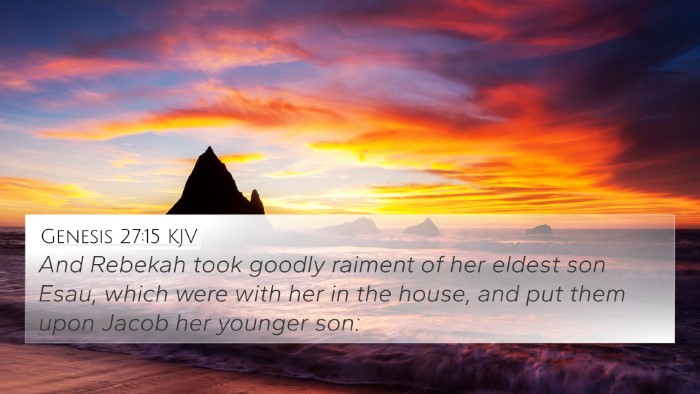
Genesis 27:15 (KJV) »
And Rebekah took goodly raiment of her eldest son Esau, which were with her in the house, and put them upon Jacob her younger son:
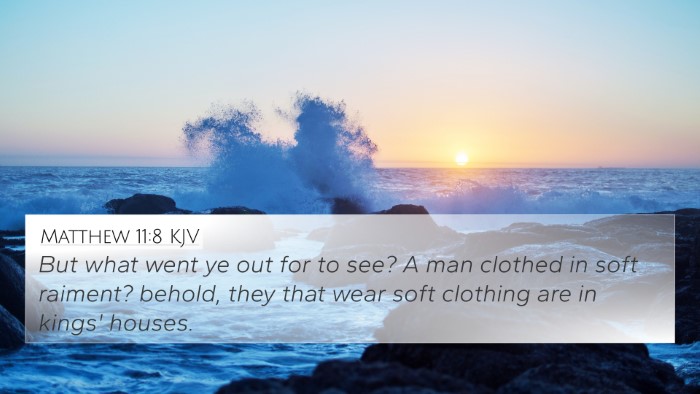
Matthew 11:8 (KJV) »
But what went ye out for to see? A man clothed in soft raiment? behold, they that wear soft clothing are in kings' houses.

Isaiah 64:6 (KJV) »
But we are all as an unclean thing, and all our righteousnesses are as filthy rags; and we all do fade as a leaf; and our iniquities, like the wind, have taken us away.
James 2:2 Verse Analysis and Similar Verses
Understanding James 2:2
James 2:2 states: "For if a man comes into your assembly with a gold ring, in fine apparel, and there should also come in a poor man in shabby clothes." This verse addresses the issue of partiality and discrimination within the Christian community.
Contextual Background
The Epistle of James is a general letter primarily addressing various issues facing Christians, including the way believers interact with one another. Here, James sets the stage for the discussion on favoritism based on outward appearances.
Commentary Insights
-
Matthew Henry:
Matthew Henry emphasizes the sinfulness of showing partiality based on a person's wealth or social status. He suggests that such behavior is not consistent with the teachings of Christ, who valued the heart and character over earthly wealth.
-
Albert Barnes:
Barnes highlights that the "assembly" refers to the Christian gathering, underscoring that this favoritism occurs among believers. He points out that God values all individuals equally, regardless of their economic status.
-
Adam Clarke:
Clarke notes that this verse illustrates the stark contrast between two classes of men, which reflects broader societal issues. He argues that the attitude of preference for the wealthy in Christian settings is a clear deviation from the gospel's teachings.
Thematic Analysis
This verse raises critical themes of favoritism, discrimination, and the equality of all people in Christ. Such themes resonate throughout the New Testament.
Bible Verse Cross-References
- James 2:1: "My brethren, do not hold the faith of our Lord Jesus Christ, the Lord of glory, with partiality." — This verse directly precedes and establishes the foundation for James 2:2.
- 1 Timothy 5:21: "I charge you before God and the Lord Jesus Christ and the elect angels, that you observe these things without prejudice, doing nothing with partiality." — This emphasizes the call for impartiality in leadership.
- Galatians 3:28: "There is neither Jew nor Greek, neither slave nor free, nor is there male and female, for you are all one in Christ Jesus." — A proclamation of equality in Christ.
- Luke 6:20: "Blessed are you who are poor, for yours is the kingdom of God." — Highlights the value of the poor in God's eyes.
- Proverbs 22:2: "The rich and the poor have this in common: The Lord is the Maker of them all." — A reminder of God’s creation of all humanity.
- Romans 2:11: "For there is no partiality with God." — Reinforces the principle that God judges without favoritism.
- Acts 10:34: "Then Peter opened his mouth and said: 'In truth I perceive that God shows no partiality.'" — Peter’s recognition that the gospel is for all, regardless of status.
- Matthew 22:16: "...Teacher, we know that you are true, and teach the way of God in truth; nor do you care about anyone; for you do not regard the person of men." — Acknowledgment of Jesus' impartiality.
- Proverbs 28:21: "To show partiality is not good, because for a piece of bread a man will transgress." — Warns against the consequences of favoritism.
- 1 Peter 1:17: "And if you call on the Father, who without partiality judges according to each one's work, conduct yourselves throughout the time of your stay here in fear." — Encourages Christians to live righteously under God’s impartial judgment.
Practical Application
Christians are called to evaluate their hearts and actions concerning favoritism and discrimination. The Church community should strive to reflect the values of Christ, ensuring equality and love for all members, regardless of their status.
Tools for Cross-Referencing
- Utilize a Bible concordance to explore various themes and verses related to favoritism.
- Employ a Bible reference guide during study sessions to gain deeper insights into related scripture.
- Explore cross-reference Bible study methods to understand broader contexts and connections.
Conclusion
James 2:2 exemplifies a critical issue within the Church regarding impartiality. By understanding this verse and its cross-references, believers can engage in a transformative journey toward greater inclusivity and love for our fellow humans.
